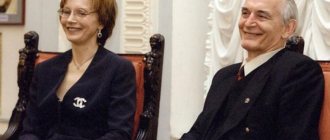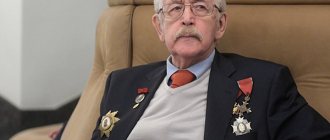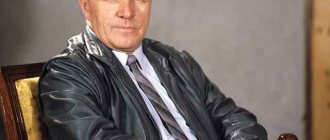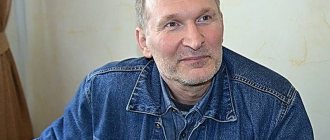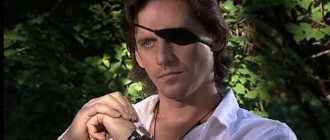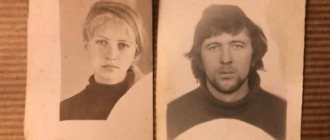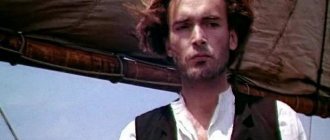Childhood and youth
No one expected from the boy from the distant Altai region what he demonstrated to everyone. Born in the village of Srostki before the war, in 1929, Vasily Makarovich had to follow the fate of his ancestors and work on the land all his life. But Shukshin was not an ordinary person, he did not agree to go with the flow and allowed himself to dream.
In 1933, a terrible tragedy befell his family. Makar Leontievich, the head of the family and breadwinner, was arrested and soon shot. To save her children from the wrath of the authorities, mother Maria Sergeevna gave them her maiden name - Popova.
At the very height of the war, Vasily finished his seven-year school and went to Biysk to enroll in a technical school. For two and a half years, Shukshin’s life flowed smoothly, and then he dropped out of school and returned to his native Srostki.
Why did Vasily Shukshin die?
Despite the fact that Vasily Makarovich suffered from a stomach ulcer for a long time, before filming began he underwent a full examination and took a course of treatment in order to be in good working shape. Filming took place in the village of Kletskaya on the Don and the entire film crew lived on the Danube motor ship. There were only two days left before the end of filming when tragedy occurred. On the morning of October 2, 1974, the actor was found dead in his cabin. According to the official conclusion of the pathologist, the cause of Vasily Shukshin’s death, which occurred in his sleep, was heart failure. But many friends and colleagues who were around in the last days and hours of his life doubt the naturalness of Shukshin’s death. They are sure that he was killed.
On the evening of October 1, Vasily Makarovich was quite healthy; he and the actor Georgy Burkov, having gone to a rural bathhouse, watched hockey on TV and went to their cabins. At about 4 o'clock in the morning, Burkov, suffering from insomnia, went out into the corridor and saw Shukshin, who complained of pain in his heart and asked to find him medicine, because validol did not help. Burkov found Zelenin's drops, put his friend to bed and left, since Shukshin did not want him to stay with him. In the morning, when Burkov came to wake Vasily up for work, he was surprised that he did not respond to his call and was lying somehow strangely. Calling actor Nikolai Gubenko, who was passing by, they went into the cabin together and discovered that Shukshin was already dead. It seemed very strange that papers and manuscripts were scattered around the cabin in disarray, which was not at all typical for the actor, and there was a clear smell of cinnamon in the air, which is typical of “heart attack gas.”
The investigators arrived, changed some of the witness statements in the documents, cleaned up the cabin and put the actor’s body in a sleeping position, after which they took photographs for the record. All requests from family and friends to conduct a second analysis to identify traces of intoxication were unsuccessful. The authorities had no need to find out the real causes of death. Shukshin's relatives believe that this was a KGB special operation. Therefore, the mystery of this death is unlikely to be solved.
Start of work
It is not surprising that in the late 40s there was constantly a shortage of money, or rather, there was simply no money. Therefore, the young man decided to move closer to the European part of the country. Without any special education, Vasily Shukshin, whose biography is a story about the life of an ordinary Soviet person, began working as a mechanic at various factories (in Kaluga, Vladimir, and the Moscow region). And in 1949 he was drafted into the army.
In 1953, Shukshin was discharged from the Navy due to a stomach illness. And again he found himself on his native land. In Srostki he passed his matriculation exams, which allowed him to go to work as a teacher. He chose Russian language and literature as his field, but, by his own admission, he was not the best teacher. At the same Srostkinskaya school he held the position of director for some time.
But even such sincere work (and Shukshin loved children very much!) could not satisfy all the ambitions of the young man.
Important dates in life
Events during the life of Vasily Shukshin that are of particular importance are given in the table.
Table 2 - important dates in the life of Vasily Shukshin
| Year | Event |
| 1943 | Completion of a seven-year rural school; becoming a student of the Biysk Automotive College |
| 1945 | Work on a rural collective farm |
| Period from 1947 to 1949 | Mechanic at turbine (Kaluga) and tractor (Vladimir) factories |
| 1949 | Call for service in the Navy (sailor of the Baltic, radio operator of the Black Sea) |
| 1953 | Dismissal from the Navy with transfer to the reserve due to diagnosis of stomach ulcer |
| 1954 | Shukshin moves to the capital and enters the All-Russian State Institute of Cinematography. S.A. Gerasimova |
| 1955 | Marries for the first time - Maria Shumskaya |
| 1956 | Vasily Makarovich took part in the second film adaptation of “Quiet Don” (directed by S.A. Gerasimov), playing the role of a sailor who looked out from behind the fence |
| 1968 | Played the main role in “Two Fedoras” |
| 1963 | Employee of the Central Film Studio of Children's and Youth Films, active printing of works, wife married for the second time - Victoria Safronova |
| 1964 | Completion of filming of the film “There Lives a Guy Like This”, third marriage (wife - Liliya Chashchina) |
| 1966,1968 | Care for Lydia Fedoseeva, birth of the first and second daughters |
| 1973 | Display of “Red Viburnum”, publication “Characteristic” |
| 2/10/1974 | Demise |
Moscow
In 1954, Shukshin, for whom Altai was everything, decided to go to the capital and conquer Moscow. There was no money even for travel, so the mother, who tried to support her son in everything, had to sell her wet-nurse-cow.
Vasily Shukshin, whose biography is an example of how dramatically human life can change, entered VGIK in 1954 to take a course with Romm, although he was originally going to the screenwriting department. He successfully graduated from the university in 1960.
But while still studying, his career as an actor began. Vasily Makarovich’s first work was an episode in “Quiet Don”, and two years later he played the main role in the film “Two Fyodors”.
Biography
Vasily Shukshin was born on July 25, 1929 in the Altai Territory, in the village of Srostki. Vasily was left early without a father, who was subjected to repression.
Life in the village of Srostki
The mother raised the children together with her new husband. Later, Shukshin would describe his adoptive father as a good-natured man whom he loved very much.
After graduating from school, Vasily moved to Biysk to study at a technical school. After studying there for two years, Shukshin dropped out of school to return home and work, since there was no one to support his family. After working briefly on a collective farm, he got a job as a mechanic. From the start of his work in 1946 until his conscription into the Navy in 1949, Shukshin traveled to many cities and factories.
While serving in the army, Shukshin became very interested in literature. In his free time, he wrote his first stories. He did not manage to serve until demobilization - for the first time, symptoms of an ulcer appeared. The attack was so severe that he was declared unfit and discharged.
Returning home, Vasily worked as a Russian language teacher. Later he was invited to the position of school director, but he did not consider teaching to be his calling.
Moving to Moscow and entering VGIK
In 1955, Shukshin went to the capital to enroll in the screenwriting department of VGIK. There was nowhere to get money for the journey, and the mother sold the cow to help her son.
Later, the film director recalled that because of his charismatic appearance, members of the selection committee suggested that he enter the acting department, but he chose directing.
Around this time, his writing abilities began to manifest themselves - Shukshin sent his works to various publishing houses in Moscow. The first success was the publication of the story “Two on a Cart.”
Filming
Shukshin could look at the world through the eyes of his character, deeply saturated with all the traits of his character.
The first of his roles was episodic. In the film "Quiet Don" he played the role of a sailor. This was a good impetus for the start of an acting career, and the next role in the film “Two Fyodors” was the main one. Further, Shukshin played only main or secondary characters with an interesting character. Table 1. The most popular roles in films.
| Movie title | Role | Year of issue |
| When the trees were big | Chairman of the collective farm | 1961 |
| Commissioner | Regimental commander | 1967 |
| Dauria | Vasily Ulybin | 1971 |
| Red viburnum | Egor Prokudin | 1973 |
| If you want to be happy | Vladimir Fedotov | 1974 |
Shukshin writer
Vasily Makarovich combined the work of a director with writing. In total, Shukshin’s bibliography contains two completed novels (“The Lyubavins” about the times of collectivization and “I came to give you freedom” about Stepan Razin), and the main message of his work is revealed in numerous short stories and novellas.
Shukshin's works are included in the golden collection of Soviet literature; their heroes are understandable and close to any ordinary person. In most of his works, the writer talked about the peasantry, about the mystery of the “Russian soul.”
Directing works
Shukshin liked to create the plot on his own, work out the character of each character and embody it on the screen. His first work, “They report from Lebyazhye,” showed all his talents - Vasily Makarovich performed the work of a screenwriter, director and actor.
He then directed the film “There Lives a Guy Like This,” which was a huge success. Shukshin was noticed and loved by the audience. During this period, his directorial style was formed.
The films that Vasily Makarovich shot immediately gained popular love and became real bestsellers. Selected films include “There Lives a Guy Like This” (1964), “Strange People” (1969), and “Stove Benches” (1972).
In 1974, the famous film “Kalina Krasnaya” was released. The film was highly appreciated, received a large number of awards from various film academies and became an important contribution to Russian cinema.
Vasily Shukshin was a unique phenomenon and won the hearts of millions of Soviet people with his creativity. His legacy, works and films, will always be relevant and instructive. Happy memory to a great man.
Literary activity
Shukshin wrote his first stories while still a sailor in the Baltic Fleet, and his colleagues read them. Well, he really took up his writing career only in Moscow, when the head of the directing course, Mikhail Romm, advised him to publish in magazines.
Smena published his first edited story, “Two on a Cart,” in 1958. In 1963, the New World magazine took over this baton. The stories “Grinka Malyugin” and “Cool Driver” appeared on its pages.
In the same year, Vasily Shukshin became the author of the book “Rural Residents”, which was published by the “Young Guard”.
In the early 1970s, a collection of short stories, Characters, was published.
Vasily Shukshin, whose books began to enjoy popularity among readers, was approvingly received by literary critics. Many noted that they had never encountered such sincerity and love for their heroes before. The writer amazed them with his plasticity, vigilance and flair for life.
Since 1958, Vasily Makarovich has published more than a hundred stories, the fairy tale “Until the Third Roosters,” several plays and stories, as well as two novels, “The Lyubavins” and “I Came to Give You Freedom.”
Vasily Shukshin, whose books are a reflection of Soviet rural reality, took a very responsible approach to the literary process. He conceived his first novel back in the 1950s. And when I was in Srostki, I talked for a long time with the old-timers, wrote down all the family tales and legends. Therefore, “The Lyubavins” is, in fact, a book about family legends, about the difficult times of the kulaks and collectivization, from which Shukshin’s own family suffered. Researchers have no doubt that all the characters in the book have their prototypes in real life.
The writer's second novel was in development for a very long time. Vasily Shukshin, whose biography has never been the subject of gossip, collected material, used archives and museums of different cities, because the hero of his book was Stepan Razin. Shukshin saw him as a defender of the peasantry, a seeker of justice and an ideal guardian of the will of the common people.
The book was published in parts in magazines and only in 1974 was published in its entirety by the publishing house "Soviet Writer".
Achievements
The most important achievements of Vasily Shukshin are listed from:
- the role of a sailor, the second film adaptation of "Quiet Don", 1956 (actor);
- leading role in “Two Fedoras”, 1958 (actor);
- “They report from Lebyazhye” (thesis work), 1960 (screenwriter);
- publication of “Two in a Cart” in Semyon (magazine publication), 1958 (writer);
- publications by “New World” (magazine publication) “Cool Driver”, “Grinka Milyugin”, 1963 (writer);
- writing the script for the film “There Lives a Guy Like This,” 1963 (screenwriter);
- printing by the Young Guard (publishing house) “Rural Residents” (book) (writer);
- screening of “Kalina Krasnaya”, which was awarded the first prize of the All-Russian Film Festival (director);
- prints “Characteristic” (writer).
Vasily Shukshin in the film “Quiet Don”
The list of achievements in the field of acting, writing film scripts, and the activities of a production director is not limited to the above.
Cinema
After graduating from university, Shukshin began working as a director at the film studio named after. Gorky. He made his first film, “They Report From Lebyazhye,” while still a student—it was his excellent thesis work.
In 1964, a film based on Shukshin’s first stories was released, “There Lives Such a Guy.” That same year, he won The Lion of Venice for Best Children's Film.
In addition, Shukshin performed 28 roles. He never had a shortage of such offers, but he tried to devote more time to directing. It was for this reason that Vasily Makarovich was forced to star in Bondarchuk’s film “They Fought for the Motherland.” Goskino set strict conditions for Shukshin, and if he refused the role, they could ban the production of a film about Stepan Razin - the same one that the director had dreamed of for many years.
Vasily Shukshin’s films have always been distinguished by their special sincerity, and the characters in his performance are the personification of all Russian life.
As a director, Shukshin became the author of six films, and among them “Stoves and Benches,” which Vasily Makarovich considered his best work.
Movies
At the same time, filming began. Shukshin's first work was episodic. In the film “Quiet Don” he got a very small role as a sailor. But this served as a good start to his acting career, pushed him to grow, and Shukshin’s next role in the film “Two Fyodors” was the main one.
Further proposals were not long in coming, and soon Shukshin the actor was much more successful than Shukshin the director. However, the master felt something more as his main calling. He was attracted by the idea of independently creating a full-fledged storyline, carefully developing each character and then bringing everything to life on the screen.
The first independent work, “They report from Lebyazhye,” realized all the author’s ambitions - Vasily Shukshin acted here as a screenwriter, director and actor. Yes, this picture was left without due attention from critics, who considered it somewhat boring, but the foundation for their own large-scale projects was laid.
His next full-length film, “There Lives a Guy Like This,” was based on the previously published stories “Cool Driver” and “Grinka Malyugin.” Vasily’s classmate at VGIK Leonid Kuravlev was invited to play the main role. This work was a massive success. Shukshin was noticed by the public and critics. During this period, his creative style fully developed.
The heroes that Shukshin portrayed in his works are simple workers with difficult characters who find themselves in difficult situations. The theme of the common man is very close to the director, who has been both a collective farmer and a worker, who deeply feels the people whose lives he writes about. Shukshin the actor, according to critics, had the ability to look at the world through the eyes of his hero, deeply getting used to all the complexities of his character. Shukshin's directorial style was remembered by the audience for its outward simplicity and restrained narrative style.
In 1974, Shukshin’s most famous film “Kalina Krasnaya”, the last author’s work, was released. The film received prestigious awards and positive reviews from critics. The story of Yegor Prokudin, who was released from prison and trying to start his life anew, literally shocked the public. Previously, such stories had not been filmed in the Union, and after the premiere, the audience cried and applauded for a long time. The film received many prizes at various film festivals.
Devoting himself entirely to the filming process, the director did not spare his health, and the increasingly frequent serious attacks of peptic ulcer disease did not affect the work schedule.
Many of the director’s plans never came true: the two-part film dedicated to the life of Stepan Razin and the peasant uprising did not receive permission to shoot. Vasily Shukshin was very passionate about this topic - he took notes on primary sources, studied the customs of the era, worked out the script and shooting plan. For the sake of this idea, he even refused to participate in other films, placing his main bet on “Stepan Razin”. At that time, the leadership of the State Cinematography Committee considered the big historical film untimely and very expensive, making it clear that filming was postponed indefinitely. Instead, he was assigned the painting “Stoves and Benches” (1972).
Initially, the director planned to invite Leonid Kuravlev to play the main role again, but he refused and invited Shukshin to play himself. He did so, and the film received recognition from critics, who wrote and said that the role of Ivan Rastorguev was played delicately.
The next film, in which Shukshin played the leading role, became his last. Vasily Shukshin died suddenly during the final stages of filming the beloved film “They Fought for the Motherland.”
"Red viburnum"
The 1974 film was the director's last, but at the same time his first in color.
This is another picture by Shukshin about Soviet reality. It talks about the recently released thief Yegor Prokudin, who comes to the village to visit his beloved woman Lyuba and begins to rebuild his life. He makes good friends, a big family... It would seem that fate is getting better. But his old friends from the colony do not want to leave Yegor alone, so he has to fight for his happiness and the life of an honest man.
“Kalina Krasnaya” is a film that German director Rainer Fassbinder called his favorite film. The film received several cinematic prizes.
It is noteworthy that the film was released practically without the edits that Goskino required, that is, it turned out to be realistic. And all because Shukshin’s ulcer worsened, and the commission, fearful of the director’s death, decided to let the movie pass without strict censorship.
Vasily Shukshin's films raise deep moral issues and demonstrate true Russian moral values.
Funeral
First, the writer was allocated a plot at the Vvedensky cemetery. But Sergei Bondarchuk personally intervened and, with his authority, secured a place at the prestigious Novodevichy. Once upon a time, Shukshin and Lydia Fedoseeva walked here in search of the grave of the beloved poet Vasily Makarovich - Sergei Yesenin. They did not know then that he was buried at Vagankovsky. While walking, the writer said thoughtfully: “I would like to lie here. But they won’t bury him.” The wife suddenly burst out - she herself did not understand how - the prophetic words: “No, Vasya, I will bury.” “Well, look,” was the answer. Now the loving wife has fulfilled her promise...
The farewell ceremony took place at the House of Cinema on October 7. A huge number of people came, and everyone carried viburnum... And also icons, crosses... After all, they were seeing off the people’s idol himself. People specially came from other cities.
Grave at Novodevichy Cemetery
Family
Vasily Shukshin’s homeland has always been a part of his life; he could not breathe the local air and talk to the people there. It was in Altai that he met his first love, Maria Shumskaya, who worked as a teacher. They got married in 1955, but Maria refused to go with her husband to Moscow. And this became her mistake.
In 1957, Shukshin asked his wife for a divorce, but Shumskaya categorically refused him. In fact, this marriage was never dissolved. Vasily Makarovich deliberately lost his passport so that the new one would not have a stamp about the ill-fated marriage.
He then married Victoria Sofronova, who gave birth to his daughter Katerina. But this union did not become durable. Since 1964, he was married to actress Lydia Chashchina, from whom he eventually left for another actress, Lydia Fedoseeva.
And so the last marriage became the happiest for Vasily Makarovich, although, again, short-lived, but then death itself intervened. Lydia and Vasily had two daughters - Maria and Olga, who became actresses.
Family and Children
The writer had only one official wife. He was very young when he met Maria Ivanovna Shumskaya. The lovers' relationship was going well, but they broke up right on their wedding day. Maria refused to go to the capital with Vasily, he went on the trip alone.
A few years later, Shukshin returned to his native village, but only to ask for a divorce. In Moscow he met another woman. Shumskaya refused to divorce her husband; they were officially together until the end of their lives. Because of this, the director even pretended to lose his passport.
The daughter of the famous writer Victoria Safronova became the new lover and center of Vasily Shukshin’s personal life. In 1965, she gave birth to the writer’s daughter, Ekaterina. At that time, their relationship went wrong, Shukshin fell in love with Lydia Alexandrova. The couple lived in a civil marriage for several years, but then they separated due to infidelity and addiction to alcohol on the part of the husband.
During the filming of the film “What a Sea It Is,” Vasily met the love of his life, Lydia Fedoseeva. At first he tried to date two women at the same time, but in the end he gave preference to his new lover. They began to live together, Lydia even married him. Since she was already a famous actress, the woman decided to leave a double surname. Fedoseeva-Shukshina was next to her husband until his death.
Almost all the women in the director’s life became famous actresses. Viewers remember and love films with the participation of Lydia Fedoseeva-Shukshina, as well as her and Vasily’s daughters, Maria and Olga. There were also rumors about Vasily's affair with actress Nonna Mardyukova, but they were not confirmed.
On October 2, 1975, Vasily Makarovich died as a result of a long battle with a stomach ulcer. His heart stopped beating during the filming of the film “They Fought for the Motherland” in the cabin of the ship “Danube”. On October 7, the actor was buried at the Novodevichy cemetery in Moscow. The Drama Theater and a street in Barnaul were posthumously named after him. Since 1976, Shukshin readings have been regularly held in the village of Srostki in memory of the famous director.
